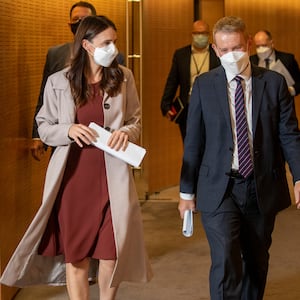Politics
New Zealanders Demand Accountability from Former Ministers in Covid-19 Inquiry

A recent poll indicates that a significant majority of New Zealanders disagree with former ministers who have opted not to provide public evidence in the ongoing Covid-19 inquiry. The inquiry, established by the Royal Commission, examines critical aspects of the government’s response to the pandemic, including vaccine distribution, mandates, and lockdown measures. With the inquiry’s report scheduled for release in February 2026, public interest in transparency is high.
The Weekend Herald published the findings of the poll, revealing that 53% of respondents oppose the decision made by former Prime Minister Jacinda Ardern, former Minister Chris Hipkins, former Finance Minister Grant Robertson, and former Minister of Health Dr. Ayesha Verrall to refrain from participating in public hearings. This decision has sparked concern among citizens who are eager for accountability regarding the government’s actions during the pandemic.
New Zealanders are calling for clarity on the decisions made during the crisis, especially given the profound impact these choices had on daily life. Restrictions, mandates, and vaccination campaigns have left lasting impressions on the populace, making the inquiry’s findings crucial for understanding the effectiveness and rationale behind the government’s approach.
As the inquiry progresses, the public’s desire for transparency remains a pressing issue. The refusal of former ministers to testify publicly has intensified scrutiny. Many feel that accountability is essential not just for the sake of historical record but also for rebuilding trust in government institutions.
The inquiry’s focus extends beyond mere policy analysis; it seeks to address the emotional and social ramifications of the government’s pandemic response. By examining the rationale behind decisions, the inquiry aims to provide a comprehensive overview of the pandemic management, offering lessons for future crises.
Public sentiment is clear: the demand for answers is strong. As the inquiry moves forward, the expectations of New Zealanders will likely shape its direction and impact. With a report due in February 2026, the urgency for public testimonies remains significant, highlighting the need for former leaders to engage with the findings and address the concerns of their constituents.
-

 World3 months ago
World3 months agoTest Your Knowledge: Take the Herald’s Afternoon Quiz Today
-

 Sports3 months ago
Sports3 months agoPM Faces Backlash from Fans During Netball Trophy Ceremony
-

 Lifestyle3 months ago
Lifestyle3 months agoDunedin Designers Win Top Award at Hokonui Fashion Event
-

 Sports3 months ago
Sports3 months agoLiam Lawson Launches New Era for Racing Bulls with Strong Start
-

 Lifestyle3 months ago
Lifestyle3 months agoDisney Fan Reveals Dress Code Tips for Park Visitors
-

 World3 months ago
World3 months agoCoalition Forms to Preserve Māori Wards in Hawke’s Bay
-

 Health3 months ago
Health3 months agoWalking Faster Offers Major Health Benefits for Older Adults
-

 Politics3 months ago
Politics3 months agoScots Rally with Humor and Music to Protest Trump’s Visit
-

 Top Stories3 months ago
Top Stories3 months agoUK and India Finalize Trade Deal to Boost Economic Ties
-

 Entertainment3 months ago
Entertainment3 months agoExperience the Excitement of ‘Chief of War’ in Oʻahu
-

 World3 months ago
World3 months agoHuntly Begins Water Pipe Flushing to Resolve Brown Water Issue
-

 Science3 months ago
Science3 months agoNew Interactive Map Reveals Wairarapa Valley’s Geological Secrets









